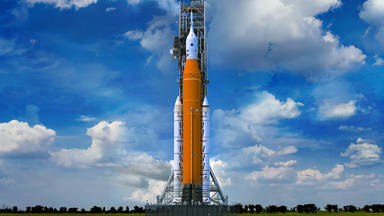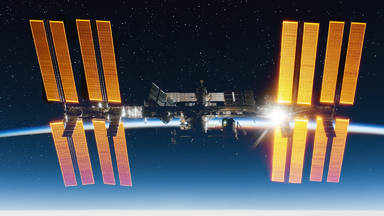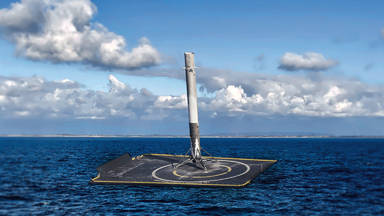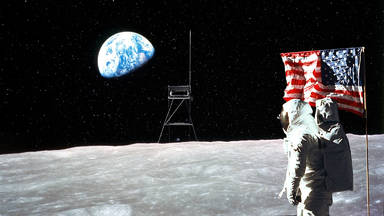
After founding NASA, we were able to get to the moon in less than 11 years. Today it has been 50 years since we've been to the moon. So why in the world is it taking so long to get to Mars?
Even if we put technological concerns to the side, we are faced with a plethora of logistical concerns. First of all, getting to the moon only takes 3 days, while getting to Mars takes between 6 and 9 months. Thus, the amount of food supplies and rocket fuel will need is exponents ahead of the moon.
Whenever you put something extra into the rocket like let's say a banana, you will be adding volume to the rocket, as well as mass. It means you need more rocket fuel, and to make things even worse, the extra rocker fuel you just added is also adding volume and mass to the rocket. So, you need even more rocket fuel to carry the rocket fuel that's supposed to be used to carry the banana.
As you can see, each extra bit of mass requires exponentially more rocket fuel, and when you are looking at a six to nine month voyage, it is pretty clear why this would turn into a big issue very quickly. The straightforward solution to this conundrum is to simply send the required supplies in multiple supply runs to Mars, before embarking on a crewed mission. But this is extremely expensive.
We are sending multi-billion dollar space shuttles on one-way trips to Mars just to provide six months worth of supplies. so the first hurdle would be to develop fully reusable rockets. But we have yet to crack the code on even this. Something else to consider is the health and mental state of a crew traveling in a can for more than six months in deep space.
Simply staying in the ISS for six to 12 months brings up a lot of health concerns regarding weightlessness, muscle mass, and bone density plummet without the help of gravity. Even when you reach Mars, you will have a similar issue as Martian gravity is 62 percent less than the gravitational force on earth.
Moreover, you still have the trip back as well. NASA estimates that due to the different orbital periods of the earth and Mars, even if you only stay at Mars for a mere 3 months, the trip there and back would take 18 months. Thus, putting the total duration of the trip at 21 months. Considering this, you will also need to send plenty of exercise equipment within the spacecraft itself. NASA estimates that after accounting for all of the food water equipment and everything else to get a crew of six to Mars and back we would need three million pounds of supplies.
To put that in perspective, the space shuttle was only capable of carrying 50,000 pounds. That's an astounding amount, but just a fraction of 3 million. We would need 60 space shuttles sent to Mars just to support one crewed Mars mission.
Even if we were doing a space shuttle launch every month, it would take 5 years to make this happen. SpaceX's new Starship rocket makes this significantly easier. As it is expected to be able to carry 100 metric tons (or 220,000 pounds) to space. But even with Starship we would need 10 to 15 supply runs just for one crewed mission.
Evidently, the logistics of completing a Mars mission is a nightmare, but it is not just the logistics that have been holding us back. In many cases it is the technology itself. Sure, we may have already had the technology to send people to Mars decades ago, but what about actually landing them on Mars safely?
The atmosphere of Mars is very thin, so we cannot use the atmosphere as an effective braking system. if you've ever seen a Mars rover landing, you will know that it is no easy task. We have to use parachutes, airbags, and sky cranes. Even with all of that, the landing is not very pleasant to say the least. Plus, that's just a few thousand pound rover. Imagine trying to land a several hundred thousand pound rocket ship on Mars.
We may be able to create some sort of small Mars landing system for the crew, but what about all the supply runs? Those have to reach the martian surface safely as well. Even if you develop a rocket ship that has no trouble dealing with the martian atmosphere, we have to keep in mind that there is no landing infrastructure available on the martian surface. No runways, no landing pads, no oceans to splash down in. Thus, the rocket would have to be capable of landing on a variable rocky terrain.
But more importantly, how would we even take off from Mars after the martian trip is over? Launches are no simple task. Thousands of engineers mechanics and scientists monitor each and every step of the rocket launch, from ensuring that there is not even the slightest bit of damage on the vehicle, to ensuring that each and every system is working correctly during launch. When you are launching from Mars, you cannot get any help during the launch itself. This is because it takes about 22 minutes for information to travel one way between Mars and the earth, and that's at the speed of light. So even the best case scenario would require 6 minutes for back and forth conversation. As we all know, it just takes seconds for something to go horribly wrong and we on earth would not even know until a minimum of three minutes after it happens.
The solution to this issue would be to either have a super reliable rocket requiring no maintenance, or a communication infrastructure that's faster than the speed of light! The space shuttle required thousands of hours of work between launches and we know that it is impossible to travel faster than the speed of light. Thus, the technological limitations of rocket reusability and communication have been large bottle caps over the past few decades.
But in fact none of this is the actuall problem. Yes, getting to Mars is extremely hard logistically, psychologically, technologically, and basically in every other realm. However, none of those are the real reason we have yet to get to Mars.
The number one reason Mars has yet to happen is politics. NASA is a government agency, and is run and funded by the government, including Congress and The White House. Politicians are only going to be pushing goals that have large public support. Yes, most people think that going to Mars would be cool, but most of them would also rather have better health care, less taxes, or more welfare. Going to Mars is not the number one political focus of the public or politicians, and NASA's funding as well as their goals have been shaped with this in mind. This is not a bad thing. It is no doubt that there are many concerns on earth that are much more significant to the average person than going to Mars. And in many cases it makes more sense to focus on problems on earth.
But unfortunately, a side effect of this approach was the stifling of NASA's Mars vision in the early 1970s. NASA actually planned to go to Mars in the 1980s. Of course, this never happened but this was not because of technological or logistical limitations.
It is no question whether or not NASA which has a budget that's tens of times greater than that of SpaceX (even with all the budget cuts), and over double the employees could have gotten people to Mars. With their 20+ billion annual budget and the smartest rocket engineers in the world they could have overcome all the technical challenges in getting to Mars within the past few decades. And they wanted to do it as well, but political influence made this impossible to achieve.
For instance, during the Nixon administration NASA's budget crashed from four percent of the federal budget to less than one percent. This led to Apollo 18, 19 and 20 being abandoned. Aside from this, president Nixon also approved what would eventually become NASA's space shuttle program. This shifted NASA's focus away from the moon and Mars, and onto low earth orbit.
Anyway, looking forward Elon Musk is well aware of this. And this is the main reason he adamantly refuses to take SpaceX public until after reaching Mars. Hopefully the laser focus they enjoy by not going public will be just what we need to reach Mars by 2030.









